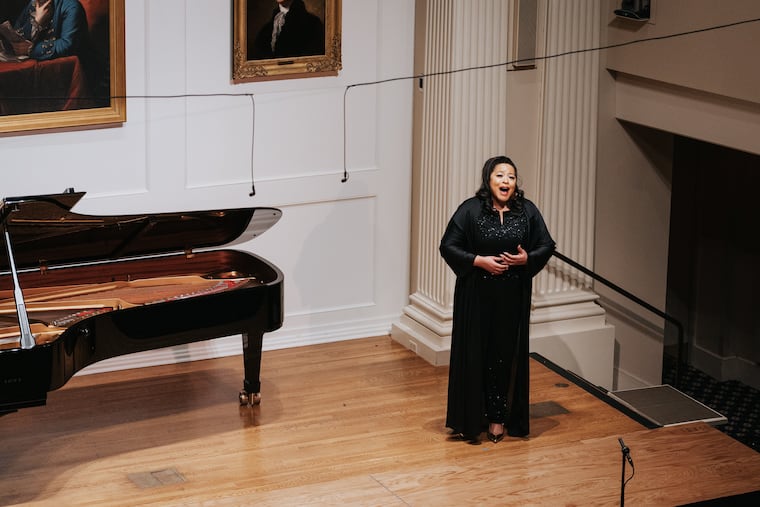Rising-star soprano Michelle Bradley makes a radiant PCMS debut
Her entrancing performance had emotional honesty and a range you’d associate with much more seasoned singers.

One significant plus emerging from the vestiges of the American opera community right now is performances with heightened emotional honesty — the latest being Michelle Bradley’s Philadelphia Chamber Music Society recital streamed Sunday from the American Philosophical Society.
This up-and-coming Houston-born soprano has what some call a “double voice”: The soprano notes are there, allowing her to scale the heights of a Verdi requiem, as she has at the Cincinnati May Festival, and there too is the kind of dark mezzo-soprano tone quality needed for a wide-ranging program that you’d associate with much more established singers.
Onstage, she stood well apart from pianist Brian Zeger and barely moved when singing Debussy, Chausson, Strauss, Mahler, and spirituals. On the YouTube stream, though, she was more entrancing than many classical performers in these circumstances. One advantage was the English subtitles to her sung texts that appeared on the bottom of the screen. But the main factor is that she radiated from within.
Debussy’s Proses lyriques, never previously heard at PCMS concerts, show the composer at his most abstract, crossing the line from enigmatic symbolism to free-floating surrealism in music that can’t be called songs but are more like energy fields that explore quickly shifting imagery.
How to interpret them? Among Debussy specialists, Denise Duval had life-and-death urgency, while Maggie Teyte was in a dream. Bradley gave the vocal lines melancholic and sinister undertows, suggesting the free-associating thought process of an individual in crisis. It worked.
Though it’s joked that French art songs should only be whispered, Bradley gave full-blooded treatment to Chausson’s Chanson perpétuelle. And with a voice like that, why shouldn’t she?
Pianist Zeger maintained interpretive neutrality in the French repertoire but had great coloristic precision in Mahler’s reflective, elegiac Rückert Songs — pieces about tasting the world anew before actually withdrawing from it. Emotions were constantly mixed, with resignation and exaltation almost in the same nanosecond, and Bradley didn’t navigate them as much as she lived them, projecting this world blissfully without calculation.
The five spirituals that ended the concert, starting with “I am Seeking for a City” and ending with “He’s Got the Whole World in his Hands,” revealed emotional parallels with Mahler. His pieces and spirituals are both about longing for redemption, grace, and a serene relationship with the hereafter. So they belong together.
The Michelle Bradley recital is available to stream free through Wednesday afternoon, with a donation requested. Information: pcmsconcerts.org.